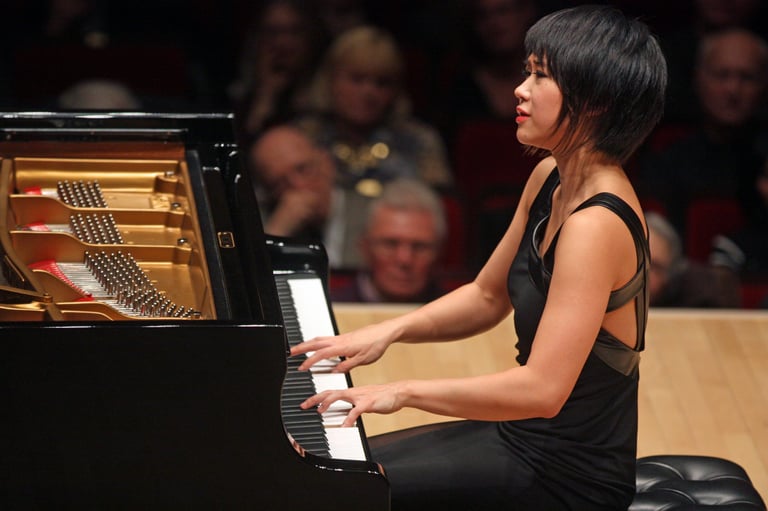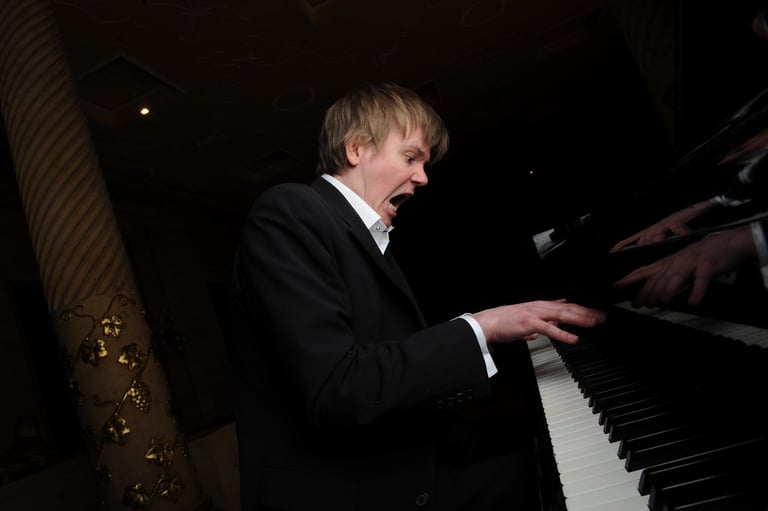Play Smarter, Not Harder: Common Piano Mistakes to Avoid
Starting your piano journey? Avoid those classic beginner blunders with this fun and helpful guide! From taming runaway fingers to mastering the mysterious pedal, we've got you covered with tips that'll make your practice smoother, your playing stronger, and your music way more exciting. Get ready to hit those keys with confidence!
MUSIC PRACTICELEARNING STRATEGIESSKILL DEVELOPMENT
Play Smarter, Not Harder: Common Piano Mistakes to Avoid
Learning the piano is like embarking on an exciting adventure! But just like exploring a new world, there are a few common traps that can slow you down. Don’t worry - these mistakes are super common, and with a few clever tricks, you’ll be playing like a pro in no time. Let's dive in!




🚫
✅
1. The "Slouch and Stiff Hands" Syndrome ✋🏻
Mistake: Sitting like a turtle with stiff hands — ouch! That’s a fast track to discomfort and frustration.
Solution: Imagine you're a majestic pianist (because you are!). Sit tall with relaxed shoulders, and keep your wrists soft and flexible. Pretend you're holding a delicate bubble in your hand — that natural curve is just what your fingers need. Keep your elbows slightly away from your body, and your feet flat on the floor. Good posture isn’t just about looking cool — it prevents strain and helps your fingers move freely.
2. Finger Number? What Finger Number? ✌🏻
Mistake: Ignoring those tiny finger numbers and hoping your hands will magically find their way.
Solution: Those numbers are like cheat codes for smooth playing! Following proper fingering builds muscle memory and prevents awkward hand shifts. For example, in scales, consistent fingering keeps your fingers moving efficiently, while in melodies, fingering helps you phrase the music beautifully. Practice hands separately first, paying attention to finger numbers, and those patterns will become second nature.
3. The "Too Fast, Too Furious" Trap 🏎️
Mistake: Rushing through pieces faster than a race car without mastering the basics.
Solution: Slow down - trust me on this! Playing at a relaxed pace helps your fingers memorise the moves. Break your piece into smaller sections and play each slowly until you can confidently connect them. Gradually increase speed using a metronome - think of it as a musical coach keeping you in time. Practicing slowly might feel dull at first, but it’s the secret to playing with confidence and precision.
4. Skipping Warm-Ups (A Rookie Move!) 🏃🏻♀️➡️
Mistake: Jumping straight into your songs without warming up.
Solution: Think of warm-ups as a power-up for your fingers. Scales, arpeggios, and finger exercises improve flexibility, strength, and accuracy. Try Hanon exercises or simple five-finger patterns to get your hands moving. Warm-ups also boost your focus, making your practice session more productive.
5. The "Robot Mode" Dilemma 🤖
Mistake: Playing notes perfectly but sounding flat and emotionless.
Solution: Music is more than just hitting the right notes - it’s about storytelling. Pay attention to dynamics (loud/soft), phrasing (where the melody breathes), and articulation (how you touch the keys - staccato, legato, etc.). Practice experimenting with these details until your playing feels expressive and personal. Recording yourself can help you spot moments that need more emotion.
6. Practice... or Just Playing Favourites? 🎧
Mistake: Spending all your practice time playing familiar pieces - while tricky spots gather dust.
Solution: Structured practice is your best friend. Divide your time into segments: warm-ups, technical exercises, new material, and review. Pinpoint difficult parts and isolate them - repeating tough bars slowly is far more effective than just replaying the entire piece. Reward yourself with your favourite songs after targeted practice.
7. Sight-Reading Shyness 🙈
Mistake: Relying on memorisation and dodging new sheet music.
Solution: Sight-reading is like solving puzzles - the more you practice, the faster you’ll recognise patterns. Start with simple pieces, focusing on rhythm, intervals, and hand coordination. Challenge yourself to sight-read a short piece daily - even a few minutes builds confidence and sharpens your reading skills.
8. Skipping Music Theory (But It’s Not Boring!) 🎼
Mistake: Thinking theory is just confusing jargon.
Solution: Music theory is your secret weapon! Understanding scales, chords, and key signatures will make learning songs easier and way more exciting. For example, recognizing a I-IV-V chord progression helps you spot patterns in countless songs. Learning theory will empower you to improvise, compose, and understand music on a deeper level.
9. The "Pedal Pile-Up" 🚲
Mistake: Pressing hard on the sustain pedal like it’s an accelerator/brake pedal - resulting in a mushy, blurry mess.
Solution: The pedal is powerful - but use it wisely. Start by practicing your pieces without the pedal to ensure clarity. Then, add the pedal selectively for smooth transitions or to enhance emotion. Mastering techniques like half-pedalling can prevent your sound from becoming muddy while adding richness and depth to your music.
10. Losing Patience (We've All Been There!) 😫
Mistake: Feeling frustrated when progress feels slow.
Solution: Be kind to yourself! Learning piano is a journey, not a race. Celebrate your victories - even small wins like mastering a tricky measure or improving your rhythm are signs of growth. Keep a practice journal to track progress and set achievable goals. Remember, every pianist faces challenges - persistence and patience are what turn beginners into pros.
Bonus Tips for Supercharged Progress 💡
Record yourself - you'll hear things you didn’t notice while playing.
Practice with purpose - focus on your weak spots rather than just replaying what you already know.
Ask for help - teachers, online tutorials, and fellow musicians can offer valuable insights and encouragement.
By sidestepping these common pitfalls and building smart practice habits, you’ll set yourself up for faster progress, better technique, and - most importantly - more joy in your music-making. Every great pianist started as a beginner, and with time, patience, and practice, you'll be amazed at how far you can go!
Share this on:
About The Author


Padmavathy Divakaran is a distinguished pianist, arranger, and music educator, currently serving as the Director of Aum Piano Studio. Formerly the representative for MTB Exams in Tamil Nadu and Karnataka - a globally recognised music education board based in the UK - she has consistently championed excellence in music education. Padmavathy holds a BA (Honours) in Music from Middlesex University, London, and a Diploma in Higher Education – Music from KM College of Music and Technology, Chennai. Her outstanding talent has been recognised through multiple scholarships and awards, including those presented by Dr. A.R. Rahman. As a performer, she has showcased her versatility across classical and contemporary genres, playing with orchestras in both London and Chennai. She was a core member of the Roliwood Seaboard Ensemble, playing a key role in the global launch of the ROLI Seaboard. Her artistry has earned her the honour of performing at prestigious events, including a special performance for Prince William, Simon Cowell, and other notable personalities at The Founders Forum in the UK - a testament to her global reach and artistic impact.